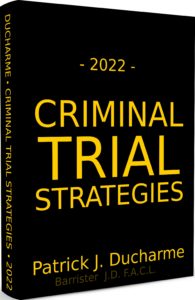Subsection 482(1) of the Code authorizes every Superior Court to make rules not inconsistent with a Federal statute. Subsection 482(2) provides a similar power to Provincial courts, subject to the approval of the Lt. Governor-in-Council of the Province. Sections 169 and 170 of the Courts of Justice Act create the Criminal Rules Committee and a procedure for enacting rules related to criminal proceedings. These are the rules permitted by section 482 of the Code. The Rules of the Ontario Court of Justice in Criminal Proceedings apply to all trials in the Ontario Court of Justice, often referred to as the Provincial Court.
The Criminal Proceedings Rules apply to proceedings in the Superior Court of Justice. The rules for Ontario Superior courts contain three themes. They are all specific to trials. They deal with exclusion of evidence, production of third-party records and applications regarding evidence of a complainant’s prior sexual conduct. The rules for Superior Court do not presently contain any specific rules applicable to trial proceedings or evidence. Rule 1.02 provides that the rules apply to “prosecutions, proceedings and applications”.
The Superior Court has an inherent jurisdiction to award costs against orders or judgments of the inferior court. The power is used sparingly and only where the circumstances are tantamount to a contempt of court or reveal malice or bad faith thereby creating a flagrant injustice. Moreover, before the order is made the Judge of the inferior court is entitled to notice and an opportunity to be heard on the question of costs.
Relaxation of Rules
The Supreme Court of Canada in Spence2 established that technical and procedural requirements may be ignored where necessary, in order to ensure fairness and the appearance of fairness from the perspective of the accused. The court determined that fairness was a primary factor. Additionally, in Lyttle3 the Supreme Court of Canada stated that just as the right of cross-examination itself is not absolute, so too are its limitations. Trial judges enjoy, in this as in other aspects of the conduct of the trial, a broad discretion to ensure fairness and to see that Justice is done and “seen to be done”. This discretion to relax the rules of procedure has extended to relaxing the rule of relevancy, and, relaxing in favour of the accused a strict rule of evidence where it is necessary to prevent a miscarriage of Justice or where the danger against which the exclusionary rule aims to safeguard does not exist.
The above is the an excerpt of Patrick J Ducharme’s book, Criminal Trial Strategies, available at Amazon or in bulk through MedicaLegal Publishing.
Read or listen to the Preface and Introduction and subscribe to Patrick Ducharme’s Youtube Channel.

